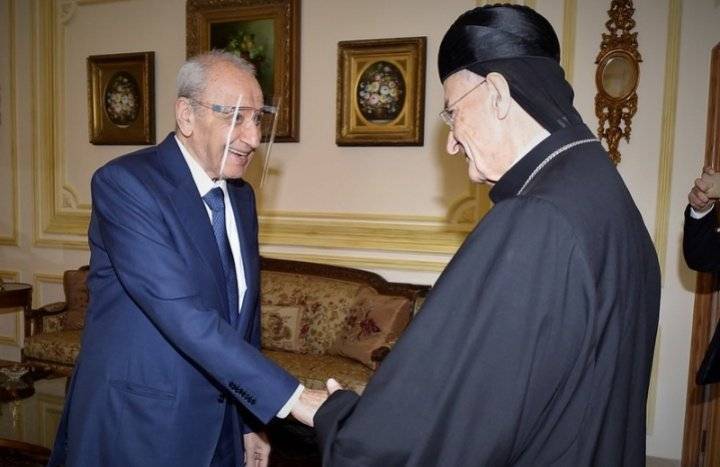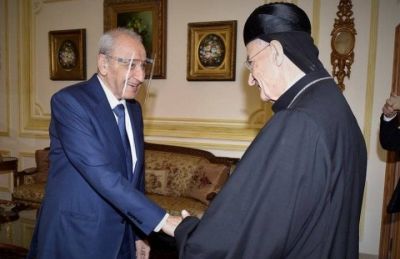
Parliament Speaker Nabih Berri meets with Patriarch Bechara al-Rai on Oct. 26 in Ain al-Tineh. (Credit: Nabih Berri press office)
Tuesday was a perfect example of how politics work in Lebanon.
In short, Maronite Patriarch Bechara al-Rai made an unusual round of visits to the Parliament speaker, the prime minister and the president in a bid to discuss two major cases: the probe into the 2020 Beirut port blast — one of the largest explosions in modern history — and the investigation into the bloody clashes that broke out in Beirut’s Tayyouneh area on Oct. 14.
Before delving into details, a short step back is necessary to understand the context that led to this visit.
For weeks, Hezbollah and the Amal Movement have been building up pressure in an attempt to block the investigation into the Beirut port explosion and to remove the lead investigator in the case, Judge Tarek Bitar. The Shiite ministers even threatened to boycott cabinet meetings until their demands were met.
However, the Tayyouneh clashes — which erupted between Hezbollah and Amal supporters against armed men allegedly from the Lebanese Forces and left seven people dead, including six from the two Shiite parties — have changed the equation.
From that point on, the 2020 explosion has been relegated to the background vis-à-vis the political standoff between Hezbollah and the LF.
The situation escalated when LF leader Samir Geagea was summoned a few days ago to appear before the Military Court, which he refused to do. This is where things get a bit trickier.
Geagea, backed by his former March 14 camp allies, castigated what he called a political attack aimed at achieving a “scandalous barter” between the port probe and the Tayyouneh investigation. In other words: we give up one case if you drop the other.
It was in this climate of high tension that Rai stepped into the game.
On Tuesday, Rai visited Parliament Speaker Nabih Berri at his residence in Ain al-Tineh, Prime Minister Najib Mikati in the Grand Serail and finally President Michel Aoun in Baabda, to discuss a general compromise aimed at finding a solution to these two cases paralyzing the government.
According to corroborating sources who attended the meetings, here’s how things went:
Rai: “You need to solve the problem.”
Berri: “The problem is with the attitude of the other side.”
Rai: “But you are an integral part of the problem, as much on the Bitar issue as on the Tayyouneh case.”
At that point in the discussion, the patriarch proposed that those implicated in the Tayyouneh fighting be brought to justice in order to calm things down, while leaving the party leaders out of the whole matter.
Berri approved. Now, it was time to discuss the other issue: the port explosion investigation.
Berri: “The solution lies in respecting the constitution and for presidents and ministers to be tried before the Supreme Council, in line with the complaints filed by the victims’ families on charges of negligence.”
However, the families themselves have rejected this proposal, demanding that all those implicated in the investigation, without exception, appear before the Court of Justice.
The families denounced what they called “new compromises that place the blood of victims and martyrs on the negotiating table and bargains.”
This is particularly relevant because Berri’s proposals would mean emptying the investigation of its substance and that Bitar would no longer be able to prosecute politicians. Rai did not oppose this proposal during his visit to Ain al-Tineh.
“However, the president has to approve this option,” Berri said. Rai then headed to Baabda to relay the message to the president.
Aoun: “In principle, I am not against this proposal, provided that the separation of powers is respected.” The president added, “But I will have to wait and see how things go in the details.”
The patriarch left Baabda, convinced that he had nailed a deal with the three senior officials — Mikati also having supported his initiative.
But a few hours later, Aoun told his associates that he opposed Rai’s initiative.
Hezbollah is divided
Why? For several reasons.
According to Baabda sources, the Beirut port explosion devastated several Christian neighborhoods, and the president could not just “blow off” the investigation, particularly because of electoral considerations.
Aoun is even more unlikely to endorse such an initiative because it would mean doing his enemy, Berri, a favor by getting his close associates, MPs Ali Hassan Khalil and Ghazi Zeaiter — both implicated in the port explosion case — off the hook. The initiative could also work to the benefit of Geagea, Aoun’s rival in the Christian arena.
In a tweet that reflected the president’s political party’s stance, his son-in-law and Free Patriotic Movement head Gebran Bassil said, “We refuse to cover up the truth about the biggest explosion that Lebanon and the world have ever seen to exonerate a criminal.”
The FPM is undoubtedly hoping to be able to count on the support of its main ally, Hezbollah.
Both parties agree on the need to pressure Geagea but have conflicting agendas regarding the port explosion probe.
Rai’s initiative provoked heated debates within the Shiite party.
“Several party members are convinced of the need to go to the end when it comes to the issue with Geagea,” a party official told L’Orient-Le Jour, stressing that the “Tayyouneh crime” must not go unpunished.
The most radical members within the party believe that Hezbollah should no longer be silent in the face of the “numerous attacks” on the party and should deal more aggressively with its opponents.
Meanwhile, the more moderate party members advocate a more Lebanese-style settlement that would defuse all tensions.
A meeting of Hezbollah’s advisory council was scheduled for Oct. 27 to settle the issue but was ultimately postponed.
“In all cases, we will keep this legal card against Geagea,” the aforementioned party official said.
The ultimate irony
For its part, the LF accuses Hezbollah and its allies of wanting to replay the 1994 scenario that led to Geagea’s imprisonment.
Hundreds of LF supporters gathered on Oct. 27 at Maarab, Geagea’s residence, to show unwavering support of their leader.
The LF supporters and sympathizers are convinced that everything has been orchestrated to undercut their leader’s position ahead of the parliamentary elections and to bury the port explosion probe.
They are all the more certain that the issue is politically motivated because the Lebanese Army intelligence, which was supposed to interrogate Geagea on the Tayyouneh events, closed the file without even mentioning his name.
In fact, according to military sources, Fadi Akiki, the government commissioner to the Military Court, contacted the intelligence directorate to ask if Geagea showed up for his interrogation on Wednesday.
When Geagea did not appear before the court, the case was closed, and no action was taken against him.
The ultimate irony is that the case is now transferred to Fadi Sawwan, who prior to Bitar led the Beirut port explosion investigation. He was removed from the probe in February under pressure from the political class.
This article was originally published in French in L’Orient-Le Jour. Translation by Sahar Ghoussoub.
In short, Maronite Patriarch Bechara al-Rai made an unusual round of visits to the Parliament speaker, the prime minister and the president in a bid to discuss two major cases: the probe into the 2020 Beirut port blast — one of the largest explosions in modern history — and the investigation into the bloody clashes that broke out...
